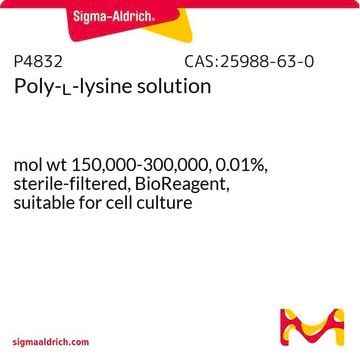P9404
Poly-L-lysine hydrochloride
suitable for cell culture, Mol wt >30,000
Synonym(s):
L-Lysine hydrochloride homopolymer
About This Item
Recommended Products
product name
Poly-L-lysine hydrochloride, mol wt >30,000
form
powder
Quality Level
mol wt
>30,000
technique(s)
FTIR: suitable
cell culture | mammalian: suitable
color
white to light yellow
storage temp.
−20°C
Looking for similar products? Visit Product Comparison Guide
1 of 4
This Item | P2658 | P2636 | P1524 |
|---|---|---|---|
| technique(s) FTIR: suitable, cell culture | mammalian: suitable | technique(s) cell culture | mammalian: suitable | technique(s) bioconjugation: suitable, cell culture | mammalian: suitable | technique(s) cell culture | mammalian: suitable |
| storage temp. −20°C | storage temp. −20°C | storage temp. −20°C | storage temp. −20°C |
| color white to light yellow | color white to light yellow | color white to faint yellow | color white to off-white |
| mol wt >30,000 | mol wt 15,000-30,000 | mol wt 30,000-70,000 | mol wt ≥300,000 |
Application
Analysis Note
Other Notes
Storage Class Code
11 - Combustible Solids
WGK
WGK 3
Flash Point(F)
Not applicable
Flash Point(C)
Not applicable
Personal Protective Equipment
Certificates of Analysis (COA)
Search for Certificates of Analysis (COA) by entering the products Lot/Batch Number. Lot and Batch Numbers can be found on a product’s label following the words ‘Lot’ or ‘Batch’.
Need A Sample COA?
This is a sample Certificate of Analysis (COA) and may not represent a recently manufactured lot of this specific product.
Already Own This Product?
Find documentation for the products that you have recently purchased in the Document Library.
Customers Also Viewed
Articles
Recently, layer-by-layer (LbL) assembly has emerged as a versatile, gentle and, simple method for immobilization of functional molecules in an easily controllable thin film morphology.1,2 In this short review, we introduce recent advances in functional systems fabricated by using the mild, yet adaptable LbL technique.
Humankind has utilized protein materials throughout its existence, starting with the use of materials such as wool and silk for warmth and protection from the elements and continuing with the use of recombinant DNA techniques to synthesize proteins with unique and useful properties.
Our team of scientists has experience in all areas of research including Life Science, Material Science, Chemical Synthesis, Chromatography, Analytical and many others.
Contact Technical Service








